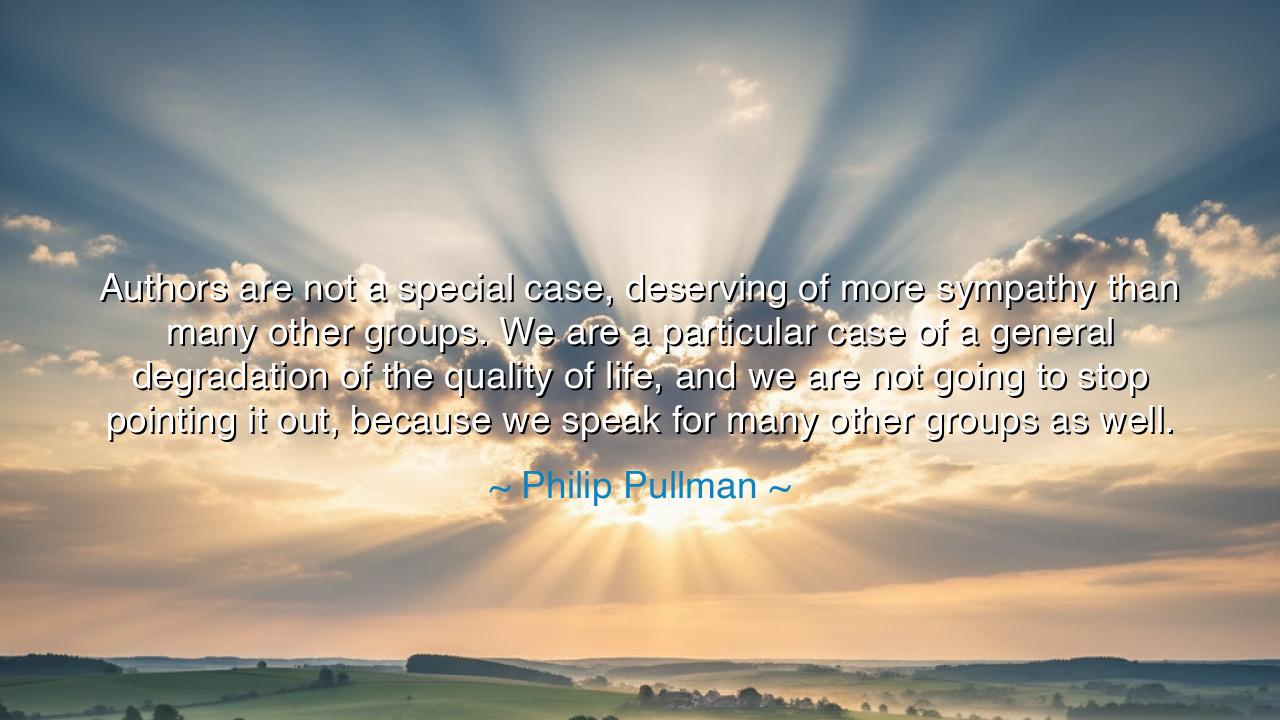
Authors are not a special case, deserving of more sympathy than
Authors are not a special case, deserving of more sympathy than many other groups. We are a particular case of a general degradation of the quality of life, and we are not going to stop pointing it out, because we speak for many other groups as well.






When Philip Pullman declared, “Authors are not a special case, deserving of more sympathy than many other groups. We are a particular case of a general degradation of the quality of life, and we are not going to stop pointing it out, because we speak for many other groups as well,” he was lifting the mantle of his craft from the shoulders of vanity and placing it upon the altar of duty. His words are not a plea for pity, but a call to solidarity, a reminder that the struggles of the author are threads in the wider tapestry of human struggle.
Too often society sees the artist as apart, as some exotic flower to be admired or scorned. But Pullman rejects this illusion. The hardships faced by those who write—the devaluation of labor, the erosion of dignity, the economic uncertainty—are not unique afflictions. They are the very same trials borne by countless others: teachers, workers, healers, and all who labor in obscurity. Thus, the writer’s plight is but a mirror held up to the suffering of many, and the writer’s voice must rise not only for himself but for the multitude who cannot be heard.
This sentiment recalls the role of the prophet in ancient lands. The prophet did not speak for himself alone, nor seek sympathy for his personal woes. He became the mouthpiece of a people, crying out against injustice, corruption, and decline. In the same way, Pullman claims that authors, through their stories and their courage, are bound to speak not only of their own condition, but of the “general degradation of the quality of life” that afflicts the many. Their struggle is not isolation but participation in the great battle for dignity.
Consider the story of Émile Zola, who in the 19th century raised his pen in the infamous J’Accuse, defending the falsely accused Alfred Dreyfus. Zola could have remained silent, guarding his own reputation, his own comfort. Instead, he took upon himself the burden of the oppressed, declaring that the voice of the writer must not serve himself but truth and justice. He was condemned, exiled, and vilified, but in speaking for one, he spoke for all. This is the living embodiment of Pullman’s creed—that the writer must be a herald of others, not a supplicant for special sympathy.
The meaning of Pullman’s words, then, is both humble and heroic. Humble, because he refuses to place authors above other groups in their sufferings. Heroic, because he declares that authors will not stop pointing it out, will not silence their critique, for their calling is to give voice to the voiceless. The writer’s pen is a lantern; where others dwell in darkness, he casts light upon their affliction, and by doing so, elevates their hidden struggles into sight.
The lesson for you, O listeners, is this: whatever your station, do not imagine that your suffering is isolated, nor that your voice is only for yourself. Understand that the burdens you carry are part of a greater whole. When you speak of your hardship, do not speak as one seeking pity, but as one drawing attention to the plight of many. In this way, your struggle becomes seed for solidarity, and your pain becomes a weapon for justice.
Practical action lies in this: wherever you labor, let your speech and your work lift the veil not only on your own challenges, but also on the struggles of others who share them. Do not be silent when you see degradation, and do not believe that only leaders or rulers are fit to speak. The power of the word, whether written or spoken, is yours as much as it is the author’s. Use it with love, with courage, and with sympathy.
Therefore, let Pullman’s words ring as a reminder: the author is not exalted above others, but joined with them. And so too are you joined with your neighbors, your companions, and even with strangers across the world. To raise your voice for them is to raise your voice for yourself, for in the end, the struggle of one is the struggle of all. Thus speak, thus act, and thus live, not as one apart, but as one bound in the unbreakable chain of humanity.






AAdministratorAdministrator
Welcome, honored guests. Please leave a comment, we will respond soon